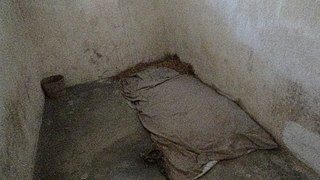Related Research Articles

Penal transportation was the relocation of convicted criminals, or other persons regarded as undesirable, to a distant place, often a colony, for a specified term; later, specifically established penal colonies became their destination. While the prisoners may have been released once the sentences were served, they generally did not have the resources to return home.

Solitary confinement is a form of imprisonment in which an incarcerated person lives in a single cell with little or no contact with other people. It is a punitive tool used within the prison system to discipline or separate incarcerated individuals who are considered to be security risks to other incarcerated individuals or prison staff, as well as those who violate facility rules or are deemed disruptive. However, it can also be used as protective custody for incarcerated individuals whose safety is threatened by other prisoners. This is employed to separate them from the general prison population and prevent injury or death.

The prison abolition movement is a network of groups and activists that seek to reduce or eliminate prisons and the prison system, and replace them with systems of rehabilitation and education that do not focus on punishment and government institutionalization. The prison abolitionist movement is distinct from conventional prison reform, which is intended to improve conditions inside prisons.

The rights of civilian and military prisoners are governed by both national and international law. International conventions include the International Covenant on Civil and Political Rights; the United Nations' Minimum Rules for the Treatment of Prisoners, the European Committee for the Prevention of Torture and Inhuman or Degrading Treatment or Punishment, and the Convention on the Rights of Persons with Disabilities.

A super-maximum security (supermax) or administrative maximum (ADX) prison is a "control-unit" prison, or a unit within prisons, which represents the most secure level of custody in the prison systems of certain countries.
Psychological punishments are punishments that aim to cause mental pain or discomfort in order to punish an individual. Psychological punishments are usually designed to cause discomfort or pain through creating negative emotions such as humiliation, shame and fear within an individual or by depriving the individual of sensory and/or social stimulation.

Penal labour is a term for various kinds of forced labour that prisoners are required to perform, typically manual labour. The work may be light or hard, depending on the context. Forms of sentence involving penal labour have included involuntary servitude, penal servitude, and imprisonment with hard labour. The term may refer to several related scenarios: labour as a form of punishment, the prison system used as a means to secure labour, and labour as providing occupation for convicts. These scenarios can be applied to those imprisoned for political, religious, war, or other reasons as well as to criminal convicts.

Ahmad Sa'adat, also known as Abu Ghassan, is a Palestinian militant and Secretary-General of the Popular Front for the Liberation of Palestine (PFLP), a Marxist–Leninist Palestinian nationalist organisation. Sa'adat graduated in 1975 from the UNRWA Teachers College, Ramallah, specializing in Mathematics. Sa'adat was elected General Secretary of the PFLP by its Central Committee in October 2001, to succeed Abu Ali Mustafa after his assassination by Israel during the Second Intifada.

The Angola Three are three African-American former prison inmates who were held for decades in solitary confinement while imprisoned at Louisiana State Penitentiary. The latter two were indicted in April 1972 for the killing of a prison corrections officer; they were convicted in January 1974. Wallace and Woodfox served more than 40 years each in solitary, the "longest period of solitary confinement in American prison history".

The United Nations Standard Minimum Rules for the Treatment of Prisoners were adopted by the United Nations General Assembly on 17 December 2015 after a five-year revision process. They are known as the Mandela Rules in honor of the former South African President, Nelson Mandela. The Mandela Rules are composed of 122 "rules". Not all are rules, but some are principles such as institutional equality and the philosophy of confinement.
Ecclesiastical prisons were penal institutions maintained by the Catholic Church. At various times, they were used for the incarceration both of clergy accused of various crimes, and of laity accused of specifically ecclesiastical crimes; prisoners were sometimes held in custody while awaiting trial, sometimes as part of an imposed sentence. The use of ecclesiastical prisons began as early as the third or fourth century AD, and remained common through the early modern era.

The separate system is a form of prison management based on the principle of keeping prisoners in solitary confinement. When first introduced in the early 19th century, the objective of such a prison or "penitentiary" was that of penance by the prisoners through silent reflection upon their crimes and behavior, as much as that of prison security. More commonly however, the term "separate system" is used to refer to a specific type of prison architecture built to support such a system.

A prison, also known as a jail, gaol, penitentiary, detention center, correction center, correctional facility, or remand center, is a facility where people are confined against their will and denied a variety of freedoms under the authority of the state, generally as punishment for various crimes. Authorities most commonly use prisons within a criminal-justice system: people charged with crimes may be imprisoned until their trial; those who have pled or been found guilty of crimes at trial may be sentenced to a specified period of imprisonment.

The 2013 California prisoner hunger strike started on July 8, 2013, involving over 29,000 inmates in protest of the state's use of solitary confinement practices and ended on September 5, 2013. The hunger strike was organized by inmates in long term solitary in the Security Housing Unit (SHU) at Pelican Bay State Prison in protest of inmates housed there that were in solitary confinement indefinitely for having ties to gangs. Another hunger strike that added to the movement started the week before in High Desert State Prison. The focus of the High Desert State Prison hunger strike was to demand cleaner facilities, better food and better access to the library.
Professor Nicola Margaret Padfield KC (hon) is a British barrister and academic. She is a former Master of Fitzwilliam College, Cambridge. and was succeeded to the position in October 2019 by Sally Morgan, Baroness Morgan of Huyton. She is Professor of Criminal and Penal Justice in the Faculty of Law, University of Cambridge. In addition to her academic work, she was a Recorder of the Crown Court from 2002 to 2014, and is a Bencher of the Middle Temple.
Gholamreza Khosravi Savadjani was a political prisoner in Iran who was executed on 1 June 2014. His execution was highly controversial due to accusations that Khosravi did not receive due process or fair treatment during his trial or leading up to his death.

In the United States penal system, upwards of 20 percent of state and federal prison inmates and 18 percent of local jail inmates are kept in solitary confinement or another form of restrictive housing at some point during their imprisonment. Solitary confinement (sometimes euphemistically called protective custody, punitive segregation (PSEG) or room restriction) generally comes in one of two forms: "disciplinary segregation," in which inmates are temporarily placed in solitary confinement as punishment for rule-breaking; and "administrative segregation," in which prisoners deemed to be a risk to the safety of other inmates, prison staff, or to themselves are placed in solitary confinement for extended periods of time, often months or years.
Criminal justice reform seeks to address structural issues in criminal justice systems such as racial profiling, police brutality, overcriminalization, mass incarceration, and recidivism. Criminal justice reform can take place at any point where the criminal justice system intervenes in citizens’ lives, including lawmaking, policing, and sentencing.

Papillon is a 2017 drama film directed by Michael Noer and also the last film by Red Granite Pictures. It tells the story of French convict Henri Charrière, nicknamed Papillon ("butterfly"), who was falsely imprisoned in 1933 in the notorious Devil's Island penal colony and escaped in 1941 with the help of another convict, counterfeiter Louis Dega. The film's screenplay is based on Charrière's autobiographies Papillon and Banco, as well as the former's 1973 film adaptation, which was written by Dalton Trumbo and Lorenzo Semple Jr. and starred Steve McQueen and Dustin Hoffman.
Prisoners' Justice Day is a solidarity movement that takes place annually on August 10. The movement began in Canada in 1974 in support of prisoners’ rights and to remember all the people who have died of unnatural deaths while incarcerated. The first Prisoners' Justice Day was held at the Millhaven Institution on August 10, 1975, on the first anniversary of Edward Nalon's death. In addition to a day of mourning, six prisoners took part in an eighteen-day hunger strike. In 1976, August 10 was recognized as a memorial day where prisoners would strike in opposition to the use of solitary confinement and to protest inmate conditions within the Prison System by going on a one-day hunger strike and refusing to work.
References
- ↑ "Council of Europe". Legislation Online. OSCE Office for Democratic Institutions and Human Rights. Retrieved 20 October 2013.
- ↑ "Recommendation Rec(2006)2-rev of the Committee of Ministers to member States on the European Prison Rules, as revised in 2020". Council of Europe.
- ↑ Council of Europe (11 January 2006). "Recommendation Rec(2006)2 of the Committee of Ministers to member states on the European Prison Rules" . Retrieved 20 October 2013.
- ↑ "European Prison Rules". Eurochips. Archived from the original on 6 August 2013. Retrieved 20 October 2013.
- ↑ van Zyl Smit, Dirk; Sonja Snacken (2009). Principles of European Prison Law and Policy (PDF). New York: Oxford University Press. ISBN 9780199228430. Archived from the original (PDF) on 2013-01-24. Retrieved 2013-07-29.
- ↑ van Zyl Smit, Dirk; Slade, Harvey (November 2020). "What's new in the 2020 European Prison Rules? Innovative provisions on separation, solitary confinement, and other prison practices". The Art of Crime. 11.
- ↑ "Recommendation Rec(2006)2-rev of the Committee of Ministers to member States on the European Prison Rules, as revised in 2020". Council of Europe.
- ↑ van Zyl Smit, Dirk; Slade, Harvey (November 2020). "What's new in the 2020 European Prison Rules? Innovative provisions on separation, solitary confinement, and other prison practices". The Art of Crime. 11.
- ↑ van Zyl Smit, Dirk; Slade, Harvey. "Updating the European Prison Rules: Analytical Report". Council of Europe.
- ↑ van Zyl Smit, Dirk; Slade, Harvey (November 2020). "What's new in the 2020 European Prison Rules? Innovative provisions on separation, solitary confinement, and other prison practices". The Art of Crime. 11.
- ↑ Short guide to the European Prison Rules (PDF). Council of Europe, Penal Reform International. 2021.
- ↑ Walmsley, R. (1995). "The European Prison Rules in Central and Eastern Europe". European Journal on Criminal Policy and Research. 3 (4): 73–90. doi:10.1007/BF02243035. S2CID 147338027.
- ↑ Wetton, Charlotte (2006). "The European Prison Rules: A Gender Critique" (PDF). Women in Prison Project. Quaker Council for European Affairs. Retrieved 20 October 2013.
- ↑ "EPSU backs Norwegian prison officers' complaint to the Council of Europe". European Federation of Public Service Unions. 26 May 2010. Archived from the original on 24 September 2015. Retrieved 20 October 2013.
- ↑ "Concern over cell-sharing and increased capacity at Cork Prison". Irish Penal Reform Trust. 14 June 2013. Retrieved 20 October 2013.
- ↑ "Human rights of St Patrick's prisoners 'ignored or violated'". RTÉ News. 16 October 2012. Retrieved 20 October 2013.
- ↑ "Armenia's prison system to comply with European Prison Rules". News.am. 27 June 2013. Retrieved 20 October 2013.